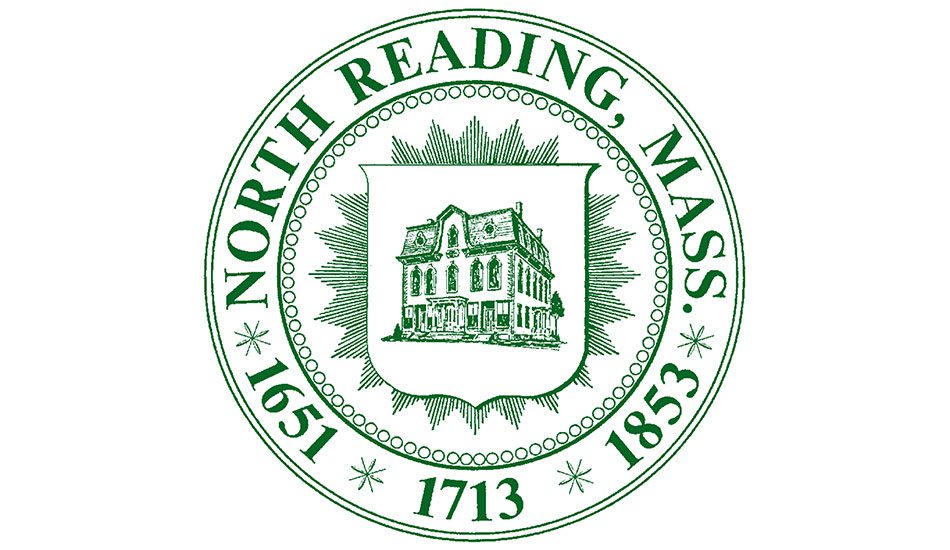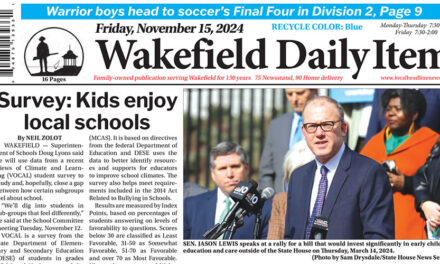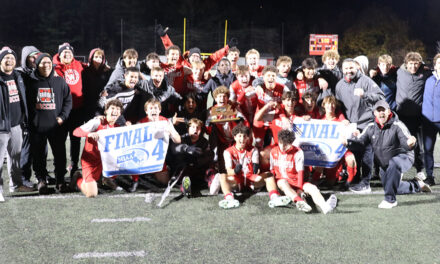By MAUREEN DOHERTY
NORTH READING — The nearly 500 voters attending Monday night’s October Town Meeting overwhelmingly rejected the MBTA Communities Act while giving the green light to move forward with separate debt exclusion override votes as a potential source of funding for both the Chestnut Street Bridge and a new ladder truck for the fire department on the November 5 ballot.
The debate on Town Meeting floor was often raucous with voters from the gallery shouting over comments made by those wishing to speak on an issue or applauding their remarks.
MBTA Communities Act
In January of 2021, the state legislature passed a change to the state’s Zoning Act by adding section 3A in what has become commonly known as the MBTA Communities Act to require 177 cities and towns adopt an overlay zoning district or districts that would allow multifamily housing at a density of 15 units per acre in the designated zone “by right.”
Among the four different types of communities as defined by their proximity to service provided by the MBTA, North Reading is defined as an “adjacent community” as the town does not receive any direct MBTA services but is located adjacent to communities that do receive commuter rail service. As such, under the law, the town is supposed to approve a zoning district or districts that would allow at least 750 units of housing by right. The deadline for towns in the same category as North Reading to comply with the law is Dec. 31, 2024.
It is notable that last year the town of Milton, which has a representative form of town meeting, approved the act at town meeting but had it overturned by a voter referendum, and the town was subsequently sued by the state’s Attorney General Andrea Campbell. Milton’s case went to court on October 7, the same day as North Reading’s town meeting, and the outcome is not expected for at least 130 days, which is beyond the Dec. 31 deadline.
Town Planner Danielle McKnight worked with the CPC over the past few years to create an overlay zoning district to present to the state regulators for compliance. The area chosen was 100 and 104 Lowell Road where the Edgewood Apartments and Martins Landing 55+ condominiums are located, both on former state land known as the JT Berry Center (which once was a state TB sanatorium in the early 1900s to 1960). The land was rezoned in the 1990s by the town as an industrial/office district and sold to private developers by the state, with the state sharing the proceeds with the town. However, when the bottom fell out of the I/O market, the state and town agreed to enable housing to be built there, although the underlying zoning district remains.
Edgewood’s 406 rental units, with 25% being affordable, enhanced the town’s housing diversity goals as did the eventual proposal by Pulte Development to create Martin’s Landing, which will have 502 units when completed. It has been stressed by town officials and Town Counsel KP Law that the 55+ age restriction at Martin’s Landing was not imposed by the town or the zoning district; it is a contractual agreement in the master deed and the condominium documents and therefore protected under contract law; the MBTA Communities Act will not change that fact, they say.
Despite such assurances that the new law and the resulting regulations being promulgated by the state’s Executive Office of Housing and Livable Communities (EOHLC) will not compel Martin’s Landing to accept families in the complex, the majority was not convinced that it would be the case.
In an overview of the act given to the voters Monday, CPC Chairman David Rudloff stated that the law, which was signed by former Gov. Baker, specifies “…that such multi-family housing shall be without age restrictions and shall be suitable for families with children” and that “an MBTA community that fails to comply shall not be eligible for four discretionary grant programs, Housing Choice Initiative, Local Capital Projects Fund, Mass Works and Housing Works.”
Rudloff also pointed out that EOHLC has spent the last 2 1/2 years drafting the compliance regulations and working with town planner, giving initial approval to this 79-acre site that is virtually built out today — exceeding the 750 minimum units required under the law. Rudloff added that the final guidelines issued August 10, 2023 states: “the purpose of Section 3A is to encourage the production of multifamily housing by requiring MBTA communities to adopt zoning districts where multi-family housing is allowed as of right, and that meet other requirements set forth in the statute.”
Rudloff further stated that the CPC held eight public hearings on this topic plus two joint sessions with the Select Board and by returning the matter to Town Meeting the board has made good on the promise made in June to let the voters decide on all three articles. He said if it does not pass the town would not be alone in rejecting it because at least “17 towns have voted it down and 60% haven’t voted yet.”
The only town committee to unanimously endorse the articles concerning the MBTA Communities Act was the Finance Committee. Dan Mills of the FinCom pointed out that since their committee acts on matters that financially impact the town all the members felt supporting it is the fiscally responsible choice given the potential loss of grant funding and knowing that the town must finance many future capital projects with limited funds.
“Our town planner did a tremendous job so that we would not be overburdened,” by the requirements of this law, Mills said, adding that he believes this plan as presented would be “least disruptive to this community.”
The Select Board supported the act 3-2 and the CPC did not have a majority. The CPC is down one member who has moved from town, therefore a tie vote results in failure. [Applicants have been sought for a future joint appointment to fill the CPC vacancy through next May by a vote of the CPC and Select Board.]
Resident Nancy Terp Elderd compared voting against the MBTA Communities Act to the actions taken by founders of this country against the King of England in 1775.
CPC member Warren Pearce, who has served on the board for over 30 years, spoke in favor of passing the overlay district as designed by McKnight given the state’s persistence in pursuing housing production through this zoning act. “The state has the ability to change our zoning at will (which) is evident with 40B,” Pearce said, noting that he has read the case the state has made against Milton in which the complaint “lists all the different ways the state tries to make sure we will do this zoning (including) appointing a special master to make this zoning happen.” Pearce added that if Milton succeeds in getting the law overturned it will be overturned for all communities.
Following the failure of Article 13 the voters passed over both Article 14: Amend Code – Zoning Bylaws – Changes to Site Plan Review, Article XVII (MBTA Zoning); and Article 15 Amend Code – Zoning Bylaws – Section 200-30 Zoning Map (MBTA Zoning).
After the failure of the MBTA Communities Act vote, an attempt by Select Board member Steve O’Leary to ask the voters to reconsider Article 7 to amend the FY25 operating budget to include funds that would cover future litigation failed. O’Leary believes that the state’s AG will sue towns that have not complied with the law just as they’ve pursued Milton and a few others to date. “We have to put our money where our mouth is if that is what we are going to do,” he said.
According to Town Counsel, because the zoning article failed it cannot be brought back to the voters for consideration again at a future Town Meeting for at least two years unless a majority of the members of the CPC agree to do so.
• Article 10 – Appropriate Money for Chestnut Street Bridge: Voters at Town Meeting approved funding the bridge as follows: $4.5M with average annual debt service estimated to be $307,688 including interest. Proposal is to seek authorization for borrowing regardless of result of debt exclusion vote. Debt Exclusion referendum on Nov. 5, 2024 State Election ballot.
If debt exclusion fails, debt would need to be absorbed into existing tax levy, impacting municipal and school services, but project could also be funded via another source at a future Town Meeting or a future debt exclusion vote.
• Article 11 – Appropriate Money for Fire Department Ladder Truck: Town meeting voted to fund a new ladder truck as follows: Estimated cost is $1.9M; average annual debt service estimated to be $142,000 including interest. Proposal is to seek authorization for borrowing regardless of result of debt exclusion vote. Debt Exclusion referendum on Nov. 5, 2024 State Election ballot.
If debt exclusion fails, debt would need to be absorbed into existing tax levy, impacting municipal and school services, but project could also be funded via another source at a future Town Meeting or a future debt exclusion vote.





